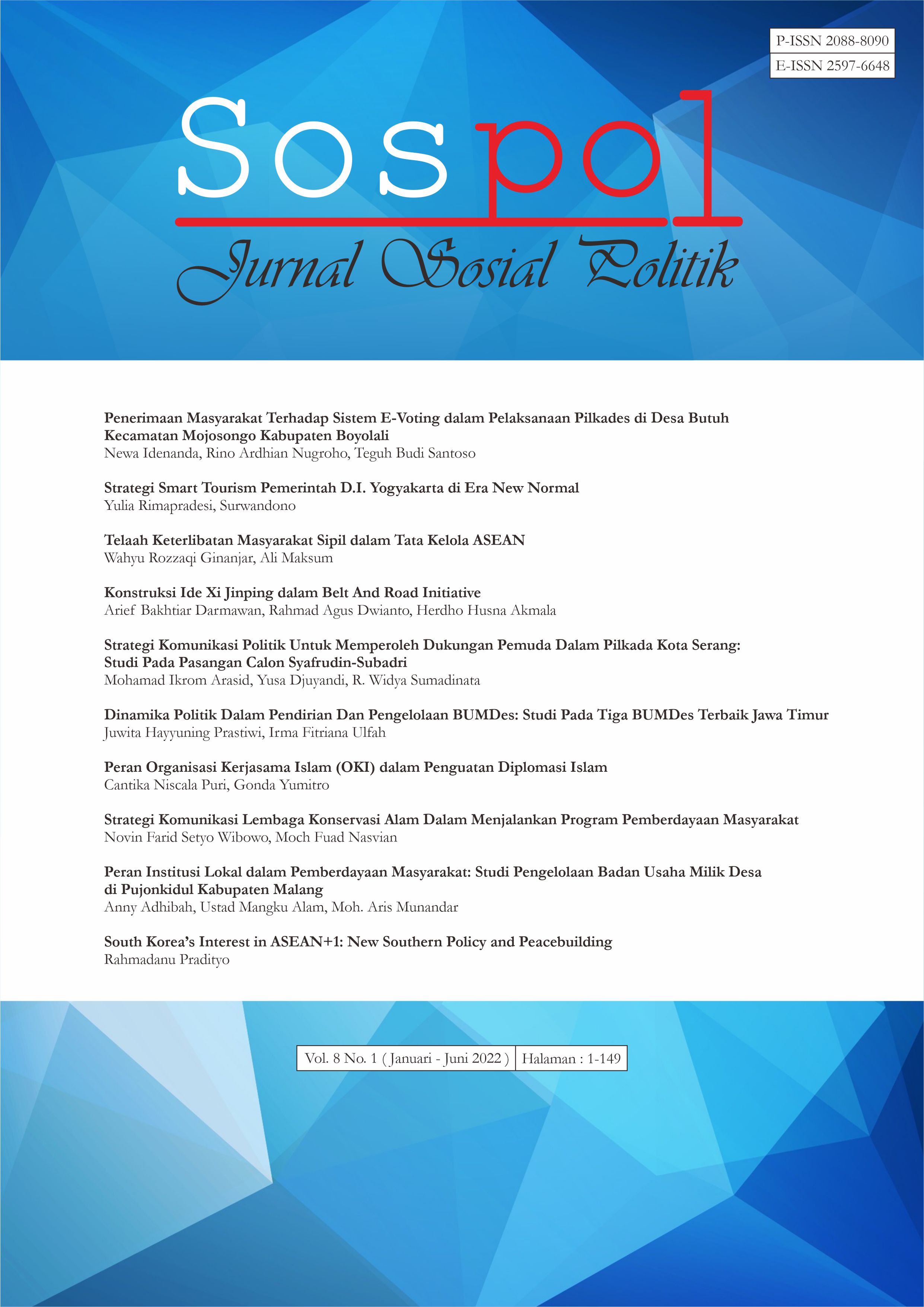Konstruksi Ide Xi Jinping dalam Belt And Road Initiative
DOI:
https://doi.org/10.22219/jurnalsospol.v8i1.19876Abstract
This paper aims to understand the role of Xi Jinping's ideas and perceptions about China's rise in the Belt and Road Initiative (BRI). It released by Xi Jinping in 2013 as the one of ambitious policy to drive China's rise as the world power. He has a strong position in Chinese politics. In addition to leading the government, Xi is the military's commander-in-chief and has the potential to serve as president for three terms. His thoughts have even entered into the Constitution of the Chinese Communist Party. Xi's accumulation of power began to be juxtaposed with Mao's power who had a sacred position in society. Using constructivist approach, this paper attempts to analyze the role of non-material factor, such as the ideas of leader, in determining the direction of Chinese foreign policy. As the qualitative research, primary data obtained from the analysis of official government documents related to Xi Jinping's speech, the Chinese constitution, BRI, as well as official websites. Meanwhile, mass media news, scientific publications as well as other research reports consider as secondary data. It examines the practice of China's foreign policy is controlled and shaped by Xi Jinping's idea of China's rise. As a result, his ideas have played a role in changing the ways of diplomacy and the use of power that see BRI as China's global strategy, especially in China's relations with the US at the global level and cooperation with Southeast Asian and East Asian countries in order to streamline the BRI project.
Downloads
References
Aoyama, R. (2016). One Belt, One Road”: China’s New Global Strategy. Journal of Contemporary East Asia Studies, 5(2), 3–22. https://doi.org/10.1080/24761028.2016.11869094
ASEAN-China Center Org. (2013). Speech by Chinese President Xi Jinping to Indonesian Parliament. http://www/asean-china-center.org/english/2013-10/03/c_ 133062675.htm
Asia News. (2020). Chinese investments in Belt and Road Initiatives plunge. http://asianews.it/news-en/Chinese-investments-in-Belt-and-Road-Initiatives-plunge-50603.html
Associated Press. (2021). China’s Communist Party, with eye on history, gives Xi Jinping the same status as Mao. WFUV Org. https://wfuv.org/content/chinas-communist-party-eye-history-gives-xi-jinping-same-status-mao
Bader, J. A. (2018). 7 things you need to know about lifting term limits for Xi Jinping. Brookings. https://www.brookings.edu/blog/order-from-chaos/2018/02/27/7-things-you-need-to-know-about-lifting-term-limits-for-xi-jinping/
BBC. (2017). Xi Jinping ’most powerful Chinese leader since Mao Zedong. https://www.bbc.com/news/world-asia-china-41730948
Bo, X. (2018). Backgrounder: Xi Jinping Thought on Socialism with Chinese Characteristics for a New Era. Xinhua. http://www.xinhuanet.com/english/2018-03/17/c_137046261.htm
Brown, K. (2018). The world according to Xi: Everything you need to know about the new China. Bloomsburry Publishing.
Cai, P. (2017). Understanding China’s belt and road initiative. Sydney: Lowy Institute for International Policy. Lowy Institute. https://www.lowyinstitute.org/publications/understanding-belt-and-road-initiative
CBC. (2017). China elevates Xi to most powerful leader in decades. https://www.cbc.ca/news/world/china-congress-xi-jinping-1.4368588
CEIC. (2021). China Direct Investment Abroad. https://www.ceicdata.com/en/indicator/china/direct-investment-abroad
Chu, B. (2017). Chinese Whispers: Membongkar Mitos tentang China. PT Gramedia Pustaka Utama.
Darmawan, A. B. (2018). Perubahan Perilaku Politik Luar Negeri Tiongkok terhadap Isu Laut Tiongkok Selatan. Journal Sospol, 4(2), 84–107. https://doi.org/https://doi.org/10.22219/sospol.v4i2.6220
Dollar, D. (2020). Seven years into China’s Belt and Road. Brookings.
Fortune. (2021). Global 500. https://fortune.com/global500/2021/search/?fg500_country=China
Garlick, J. (2020). The regional impacts of China’s Belt and Road Initiative. Journal of Current Chinese Afairs, 49(1), 3–13. https://doi.org/https://doi.org/10.1177/1868102620968848
Hadiwinata, S. B. (2017). Studi dan Teori Hubungan Internasional Arus Utama, Alternatif, Reflektivis. Yayasan Pustaka Obor Indonesia.
He, A. (2020). The Belt and Road Initiative: Motivations, financing, expansion and challenges of Xi’s ever-expanding strategy. Journal of Infrastructure, Policy and Development, 4(1), 139–169. https://doi.org/http://dx.doi.org/10.24294/jipd.v4i1.1180
Hillman, J. E. (2018). China’s belt and road initiative: Five years later. CSIS. https://www.csis.org/analysis/chinas-belt-and-road-initiative-five-years-later-0
Hussain, N., & Shakoor, F. (2017). The role of leadership in foreign policy: A case study of Russia under Vladimir Putin. IPRI Journal, 17(1), 1–25.
Jinping, X. (2012a). Achieving Rejuvenation Is the Dream of the Chinese People. NPC Govt. http://www.npc.gov.cn/englishnpc/c23934/202006/32191c5bbdb04cbab6df01e5077d1c60.shtml
Jinping, X. (2012b). The People’s Wish for a Good Life Is Our Goal. NPC Govt. http://www.npc.gov.cn/englishnpc/c23934/202005/c800ae87a9744e399486456f8cbe417c.shtml
Jinping, X. (2017). Full text of President Xi’s speech at opening of Belt and Road forum. https://www.mfa.gov.cn/ce/surabaya/eng/jrzg_2/t1470180.htm
Korwa, J. R. V. (2019). Kebangkitan China melalui Belt and Road Initiative dan (Re)konstruksi Hubungan Internasional dalam Sistem Westphalia. Journal Hubungan Internasional, 8(1), 1–10.
Kurniawan, Y. (2016). One Belt One Road (Obor): Agenda Keamanan Liberal Tiongkok? Journal Politica, 7(2). https://doi.org/https://doi.org/10.22212/jp.v7i2.1135
Lamont, C., & Boduszynski, M. P. (2020). Research Methods in Politics and International Relations. SAGE.
Lee, A. (2020). Belt and Road Initiative debt: how big is it and what’s next? South China Morning Post.
Li, J., Qian, G., Zhou, K. Z., Lu, J., & Liu, B. (2021). Belt and Road Initiative, globalization and institutional changes: implications for firms in Asia. Asia Pacific Journal of Management. https://doi.org/https://doi.org/10.1007/s10490-021-09770-0
Li, X., & Wang, W. (2015). The “Silk Road Economic Belt” and the “China Dream” Relationship: A Strategy or Tactic. Sociology Study, 5(3), 169–175. https://doi.org/: 10.17265/2159‐5526/2015.03.001
Li, Y. (2017). Belt and Road: A Logic Behind the Myth. In CHINA’S BELT AND ROAD: A GAME CHANGER? (pp. 13–33). ISPI.
Moodys. (2019). Moody’s: Chinese overseas infrastructure investment to slow amid growing risk awareness. https://www.moodys.com/research/Moodys-Chinese-overseas-infrastructure-investment-to-slow-amid-growing-risk--PR_407210
Mühlhahn, K. (2019). Making China Modern: From the Great Qing to Xi Jinping. Belknap Press.
Mulvenon, J. (2017). Xi Jinping Has a Cool New Nickname: “Commander-in-Chief.” https://www.hoover.org/sites/default/files/research/docs/clm51jm.pdf
Nedopil, C. (2020). China’s Investments in the Belt and Road Initiative (BRI) in 2020. https://greenfdc.org/wp-content/uploads/2021/01/China-BRI-Investment-Report-2020.pdf
NikkeiAsia. (2020). Japan, China and South Korea to delay trilateral summit to 2021. https://asia.nikkei.com/Politics/International-relations/Japan-China-and-South-Korea-to-delay-trilateral-summit-to-2021
NikkeiAsia. (2021). Full text of Xi Jinping’s speech on the CCP’s 100th anniversary. https://asia.nikkei.com/Politics/Full-text-of-Xi-Jinping-s-speech-on-the-CCP-s-100th-anniversary
Nye, J. S. (2019). Trump’s Effect on US Foreign Policy. https://www.project-syndicate.org/commentary/trump-long-term-effect-on-american-foreign-policy-by-joseph-s-nye-2019-09
Philips, T. (2017). Xi Jinping becomes most powerful leader since Mao with China’s change to constitution. https://www.theguardian.com/world/2017/oct/24/xi-jinping-mao-thought-on-socialism-china-constitution
Preston, T. (2010). Leadership and foreign policy analysis. Oxford Research Encyclopedia of International Studies. https://doi.org/https://doi.org/10.1093/acrefore/9780190846626.013.255
Shankaran, S. (2020). Is Xi Jinping the most powerful and dangerous man in the world? https://timesofindia.indiatimes.com/blogs/cash-flow/is-xi-jinping-the-most-powerful-and-dangerous-man-in-the-world/
Shepard, W. (2020). How China Is Losing Support For Its Belt And Road Initiative. https://www.forbes.com/sites/wadeshepard/2020/02/28/how-beijing-is-losing-support-for-its-belt-and-road-initiative/?sh=7fc1f0c92199
Simonov, E., & Withanage, H. (2019). A Briefing on the Belt and Road Initiative. Friends of the Earth Asia Pacific. https://foeasiapacific.org/wp-content/uploads/2020/01/200129-FoE-APac-belt-and-road-briefing-WEB_Final.pdf
Sinaga, L. C. (2020). XI JINPING, “CHINA DREAM”, AND CHINESE MILITARY DIPLOMACY TO ASEAN. Journal of Asean Studies, 8(2), 173–190. https://doi.org/. https://doi.org/ 10.21512/jas.v8i2.6483
Theys, S. (2017). KONSTRUKTIVISME. In Dasar-dasar Kajian Teori Hubungan Internasional (pp. 43–51). Komojoyo Express.
Tiezzi, S. (2017). What Did China Accomplish at the Belt and Road Forum? The Diplomat. https://thediplomat.com/2017/05/what-did-china-accomplish-at-the-belt-and-road-forum/
Tsang, S. (2019). What is Xi Jinping Thought? Forbes. https://forbes.kz/life/observation/what_is_xi_jinping_thought/
Wang, Z. (2014). The Chinese Dream: Concept and Context. Journal of Chinese Political Science, 19, 1–13. https://doi.org/DOI 10.1007/s11366-013-9272-0
Week In China. (2016). Funding Belt and Road. https://www.weekinchina.com/chapter/belt-and-road/how-is-belt-and-road-being-funded/
Wuthnow, J. (2017). Chinese Perspectives on the Belt and Road Initiative: Strategic Rationales, Risks, and Implications. Institute for National Strategic Studies.
Xiangwei, W. (2017). Analysis: how Xi Jinping revived old methods by abandoning intraparty democracy. South China Morning Post. https://www.scmp.com/week-asia/opinion/article/2118352/analysis-how-xi-jinping-revived-old-methods-abandoning-intraparty?module=perpetual_scroll&pgtype=article&campaign=2118352
Xinhua. (2017). Full text of Xi Jinping’s report at 19th CPC National Congress. China Daily. https://www.chinadaily.com.cn/china/19thcpcnationalcongress/2017-11/04/content_34115212.htm
Yamada, G., & Palma, S. (2018). Is China’s Belt and Road working? A progress report from eight countries. NikkeiAsia.
Yamei. (2017). Full text: Joint communique of leaders roundtable of Belt and Road forum. Xinhua. http://www.xinhuanet.com//english/2017-05/15/c_136286378.htm
Downloads
Published
How to Cite
Issue
Section
License
Copyright (c) 2022 Arief Bakhtiar Darmawan, Rahmad Agus Dwianto, Herdho Husna Akmala

This work is licensed under a Creative Commons Attribution-ShareAlike 4.0 International License.
Authors who publish with this journal agree to the following terms:
- Authors retain copyright and grant the journal right of first publication with the work simultaneously licensed under a Creative Commons Attribution-ShareAlike 4.0 International License that allows others to share the work with an acknowledgement of the work's authorship and initial publication in this journal.
- Authors are able to enter into separate, additional contractual arrangements for the non-exclusive distribution of the journal's published version of the work (e.g., post it to an institutional repository or publish it in a book), with an acknowledgement of its initial publication in this journal.
- Authors are permitted and encouraged to post their work online (e.g., in institutional repositories or on their website) prior to and during the submission process, as it can lead to productive exchanges, as well as earlier and greater citation of published work (See The Effect of Open Access).

This work is licensed under a Creative Commons Attribution-ShareAlike 4.0 International License.



















